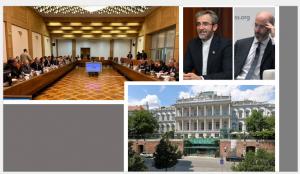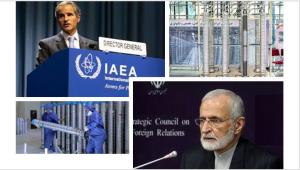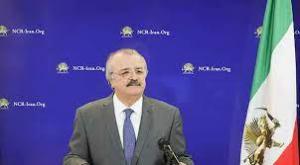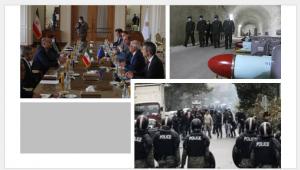Tehran, represented by Deputy Foreign Minister Ali Bagheri in these talks, still refuses to meet directly with U.S. special envoy Robert Malley in these talks.
PARIS, FRANCE, August 8, 2022 /EINPresswire.com/ — The latest round of Iran nuclear talks in Vienna began on Thursday with skepticism from both sides.European Union states have refused to send senior officials and already signs indicate the rift separating Tehran and Washington has only expanded since the previous talks in Vienna, according to European Union diplomats talking with Bloomberg.

EU officials familiar with the ongoing talks have told the media that considering the Iranian regime’s continuous violations of its nuclear commitments in recent months, there are at least two nuclear-related issues added to the already difficult list of six or seven obstacles.
The resolution of these technical matters said to be possible within 72 hours, is most likely conditioned on ground-breaking political decision-making by the U.S. and the mullahs’ regime.
State-run media in Iran are also skeptical about the current talks and the entire deal in general. The “Jahan-e Sanat” described the latest round of Vienna talks as both “encouraging” & “concerning.””
— MEK
All the while, diplomats talking to various media outlets say they see no meaningful readiness in Tehran or Washington to budge, or at least budge first.
Tehran, represented by Deputy Foreign Minister Ali Bagheri Kani in these talks, still refuses to meet directly with U.S. special envoy Robert Malley in these talks.

EU diplomats are saying the Iranian regime’s escalating stockpile of 60 percent enriched uranium, a level that inspectors of the United Nations nuclear watchdog, the International Atomic Energy Agency, describe as all but indistinguishable from the 90 percent weapons grade.
This has only added to the long slate of complications before any deal.
Another key issue remains Tehran’s ongoing persistence on the IAEA dropping its probe into decades-old nuclear activities and outstanding questions about enriched uranium found at three undisclosed sites in Iran.
There are reports circulating in the media that the Iranian regime team has relented on previous conditions that the U.S. list its terrorist-designation of the Revolutionary Guards (IRGC) and bring an end to the resulting sanctions.
However, the regime’s official news agency, IRNA, has denied such a development, adding to the ambiguities. What is certain is the fact that Tehran continues to insist on Washington guaranteeing the U.S. will never nix the nuclear agreement in the future.
The Biden administration has made it clear in the past that this demand from the mullahs is a non-starter.
The mullahs’ regime is taking advantage of this elongated process of talks-no talks to further develop its nuclear weapons program and ballistic missiles as means to deliver a payload.
Mohammad Mohaddessin, Chairman of the Foreign Affairs Commission of the National Council of Resistance of Iran (NCRI), reiterates the proven fact that Tehran will only respond to a policy of firmness and decisive measures.
The NCRI is the Iranian opposition coalition with the People’s Mojahedin Organization of Iran (PMOI/MEK) as its cornerstone member.

“Iran’s regime will not relinquish nuclear weapons. Its officials talk of bomb production. Negotiations give Tehran the time needed. If the world doesn’t want nuclear terrorists they must show firmness, reactivate United Nations Security Council resolutions, and wide-ranging sanctions/inspections,” Mr. Mohaddessin said in a tweet.
“20 years ago, the NCRI unveiled Iran’s Natanz and Arak sites. Instead of sanctions and punishment, the West chose talks and major concessions. Big mistake! If a firm policy was adopted Tehran would never be so close to the bomb. The world should not repeat the same mistakes,” he explained.
State-run media in Iran are also skeptical about the current talks and the entire deal in general. The “Jahan-e Sanat” newspaper described the latest round of Vienna talks as both “encouraging” and “concerning.”
Encouraging for the indications that reaching a deal apparently remains possible and concerning due to conditions it describes as “strange and complicated” before Tehran in these negotiations.
“If we don’t understand the status quo as necessary, it can be an end to any revival of the 2015 nuclear deal and result in harsh consequences,” the article adds, especially since the “Western party resorts to threats and even new sanctions!”
The “Sharq” daily does not rule out a nuclear agreement but considers hopes of conclusions in these talks as “dismal,” adding “it is doubtful that these Vienna talks can open the knots of the nuclear talks and one cannot be too hopeful in these negotiations.”
Former regime officials are describing the new Borrell proposal as a “lever to impose pressure” and voice doubts that the U.S. and Europe will be willing any new concessions to the Iranian regime.

Not only will they refuse to lift sanctions off the IRGC or end its terrorist designation, but non-nuclear sanctions will also remain intact, they add.
All the while, concerns are escalating in Tehran over the possibility of further economic pressures if the mullahs’ regime refuses the West’s demands for a nuclear deal.
Diplomats involved in the process believe politics may block the two sides from agreeing to the current proposal put forward on July 20 by EU foreign policy chief Josep Borrell.
The Biden administration is already facing stiff bipartisan opposition to a nuclear deal with the mullahs’ regime as an untrustworthy party known as the world’s leading state sponsor.
Shahin Gobadi
NCRI
+33 6 61 65 32 31
email us here
Former FM claims Tehran is capable of making nuclear weapons, but no decision made yet Kamal Kharrazi told Al-Jazeera: “Iran is able to produce a nuclear bomb.”
Tehran, represented by Depuy Foreign Minister Ali Bagheri in these talks, still refuses to meet directly with U.S. special envoy Robert Malley in these talks.
— MEK
PARIS, FRANCE, August 8, 2022 /EINPresswire.com/ — The latest round of Iran nuclear talks in Vienna began on Thursday with skepticism from both sides.European Union states have refused to send senior officials and already signs indicate the rift separating Tehran and Washington has only expanded since the previous talks in Vienna, according to European Union diplomats talking with Bloomberg.
EU officials familiar with the ongoing talks have told the media that considering the Iranian regime’s continuous violations of its nuclear commitments in recent months, there are at least two nuclear-related issues added to the already difficult list of six or seven obstacles.
The resolution of these technical matters said to be possible within 72 hours, is most likely conditioned on ground-breaking political decision-making by the U.S. and the mullahs’ regime.
All the while, diplomats talking to various media outlets say they see no meaningful readiness in Tehran or Washington to budge, or at least budge first.
Tehran, represented by Deputy Foreign Minister Ali Bagheri Kani in these talks, still refuses to meet directly with U.S. special envoy Robert Malley in these talks.
EU diplomats are saying the Iranian regime’s escalating stockpile of 60 percent enriched uranium, a level that inspectors of the United Nations nuclear watchdog, the International Atomic Energy Agency, describe as all but indistinguishable from the 90 percent weapons grade.
This has only added to the long slate of complications before any deal.
Another key issue remains Tehran’s ongoing persistence on the IAEA dropping its probe into decades-old nuclear activities and outstanding questions about enriched uranium found at three undisclosed sites in Iran.
There are reports circulating in the media that the Iranian regime team has relented on previous conditions that the U.S. list its terrorist-designation of the Revolutionary Guards (IRGC) and bring an end to the resulting sanctions.
However, the regime’s official news agency, IRNA, has denied such a development, adding to the ambiguities. What is certain is the fact that Tehran continues to insist on Washington guaranteeing the U.S. will never nix the nuclear agreement in the future.
The Biden administration has made it clear in the past that this demand from the mullahs is a non-starter.
The mullahs’ regime is taking advantage of this elongated process of talks-no talks to further develop its nuclear weapons program and ballistic missiles as means to deliver a payload.
Mohammad Mohaddessin, Chairman of the Foreign Affairs Commission of the National Council of Resistance of Iran (NCRI), reiterates the proven fact that Tehran will only respond to a policy of firmness and decisive measures.
The NCRI is the Iranian opposition coalition with the People’s Mojahedin Organization of Iran (PMOI/MEK) as its cornerstone member.
“Iran’s regime will not relinquish nuclear weapons. Its officials talk of bomb production. Negotiations give Tehran the time needed. If the world doesn’t want nuclear terrorists they must show firmness, reactivate United Nations Security Council resolutions, and wide-ranging sanctions/inspections,” Mr. Mohaddessin said in a tweet.
“20 years ago, the NCRI unveiled Iran’s Natanz and Arak sites. Instead of sanctions and punishment, the West chose talks and major concessions. Big mistake! If a firm policy was adopted Tehran would never be so close to the bomb. The world should not repeat the same mistakes,” he explained.
State-run media in Iran are also skeptical about the current talks and the entire deal in general. The “Jahan-e Sanat” newspaper described the latest round of Vienna talks as both “encouraging” and “concerning.”
Encouraging for the indications that reaching a deal apparently remains possible and concerning due to conditions it describes as “strange and complicated” before Tehran in these negotiations.
“If we don’t understand the status quo as necessary, it can be an end to any revival of the 2015 nuclear deal and result in harsh consequences,” the article adds, especially since the “Western party resorts to threats and even new sanctions!”
The “Sharq” daily does not rule out a nuclear agreement but considers hopes of conclusions in these talks as “dismal,” adding “it is doubtful that these Vienna talks can open the knots of the nuclear talks and one cannot be too hopeful in these negotiations.”
Former regime officials are describing the new Borrell proposal as a “lever to impose pressure” and voice doubts that the U.S. and Europe will be willing any new concessions to the Iranian regime.
Not only will they refuse to lift sanctions off the IRGC or end its terrorist designation, but non-nuclear sanctions will also remain intact, they add.
All the while, concerns are escalating in Tehran over the possibility of further economic pressures if the mullahs’ regime refuses the West’s demands for a nuclear deal.
Diplomats involved in the process believe politics may block the two sides from agreeing to the current proposal put forward on July 20 by EU foreign policy chief Josep Borrell.
The Biden administration is already facing stiff bipartisan opposition to a nuclear deal with the mullahs’ regime as an untrustworthy party known as the world’s leading state sponsor.
Shahin Gobadi
NCRI
+33 6 61 65 32 31
email us here
Former FM claims Tehran is capable of making nuclear weapons, but no decision made yet Kamal Kharrazi told Al-Jazeera: “Iran is able to produce a nuclear bomb.”
![]()






